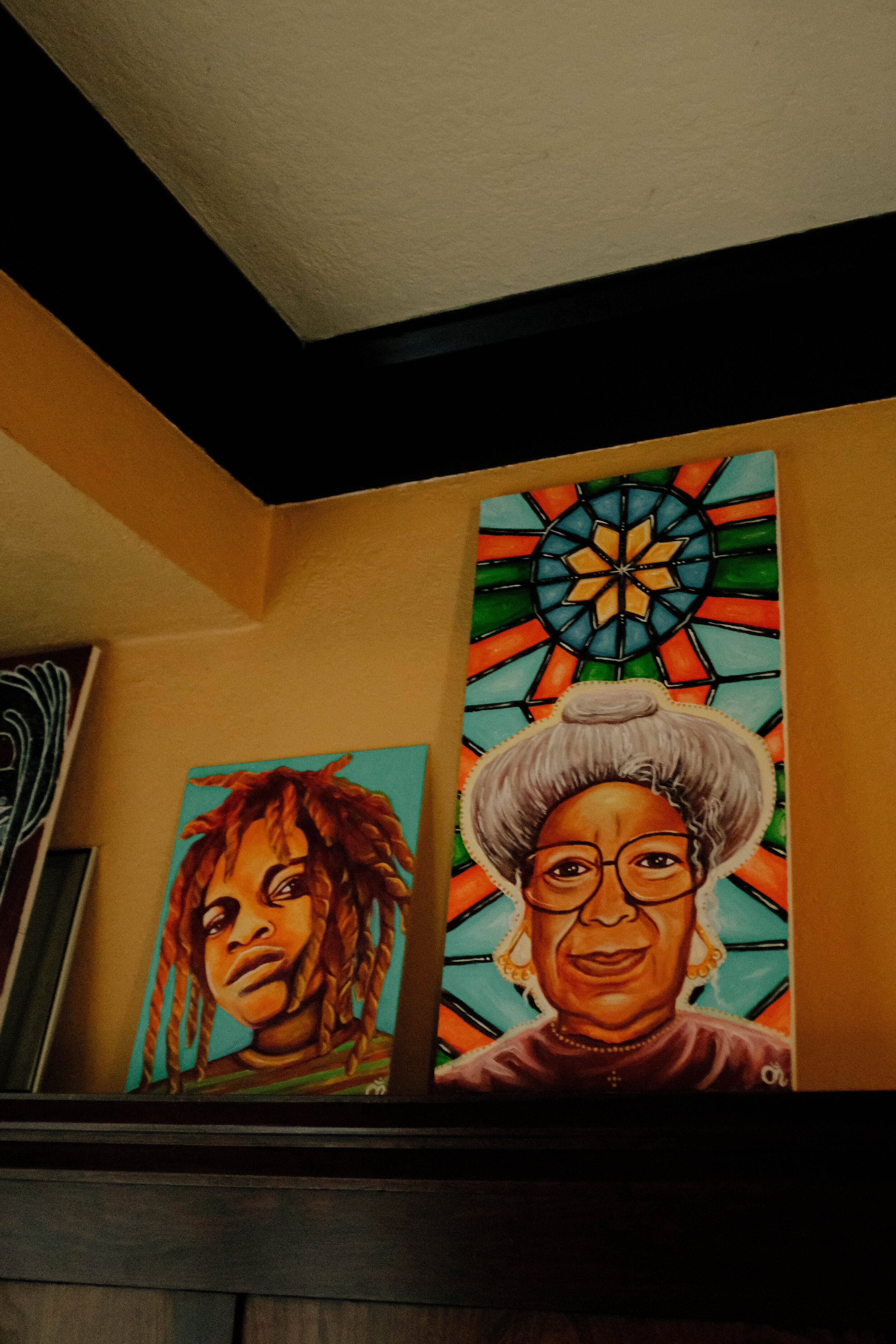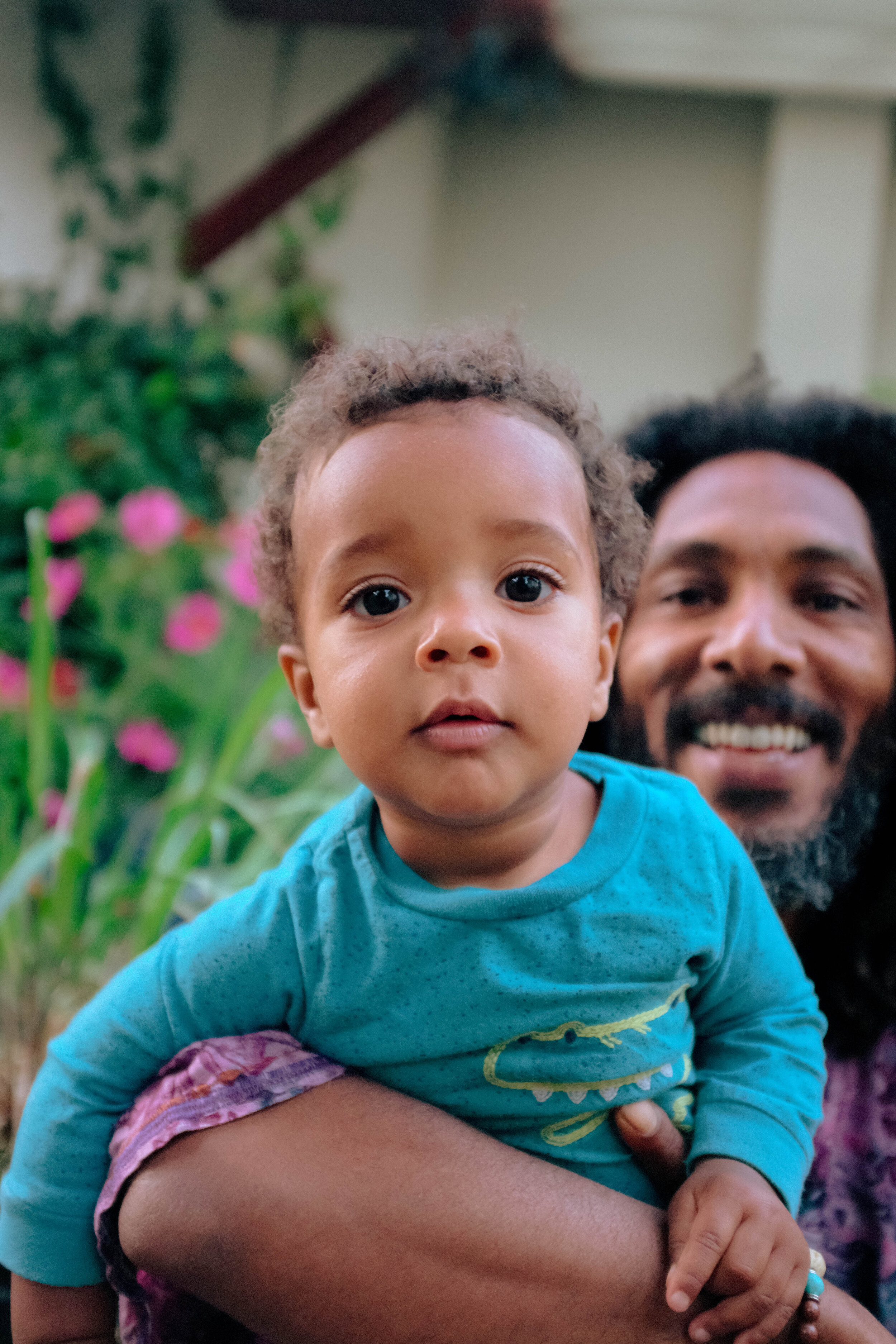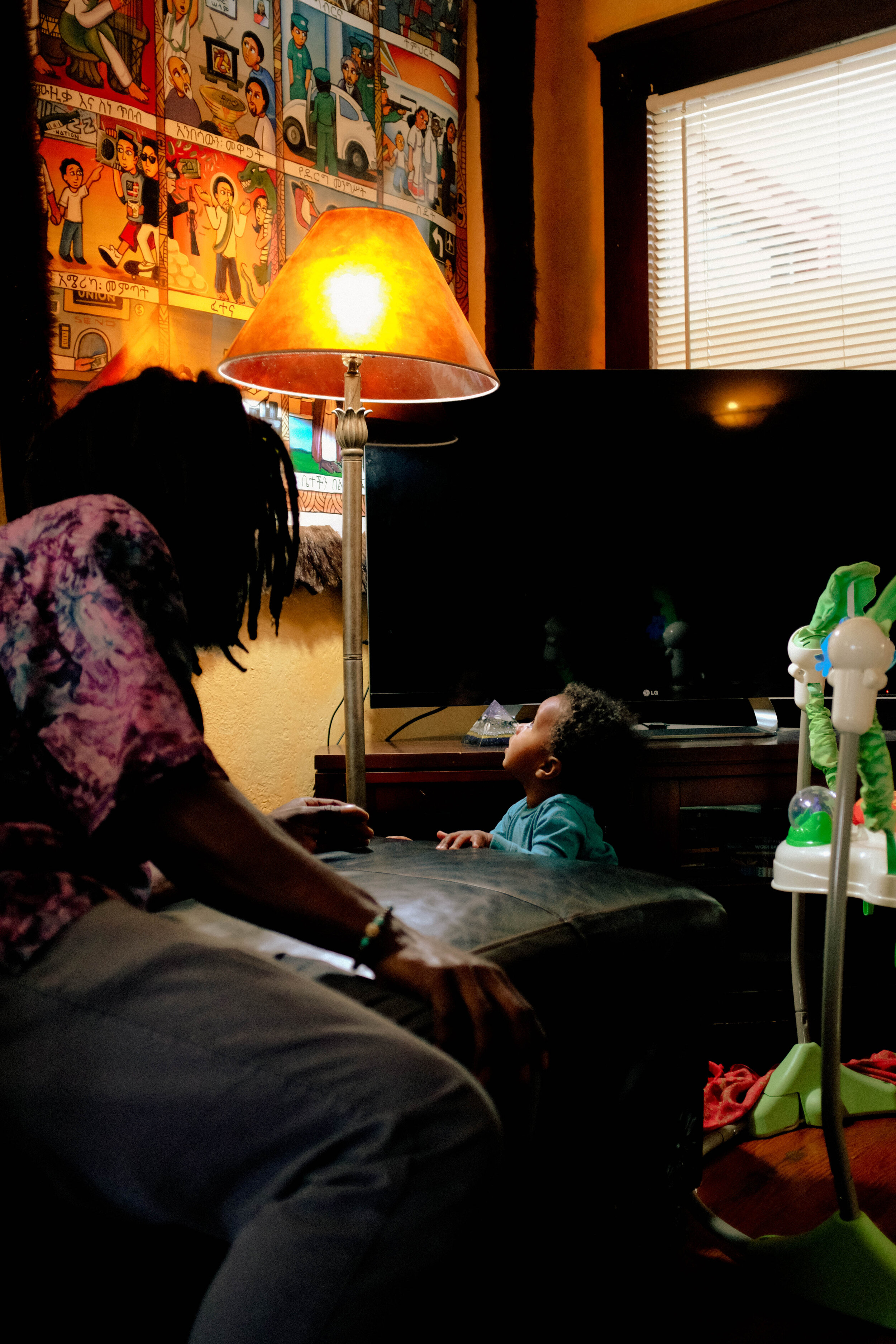
“I think our elders should retire with more grace and with their flowers before they die…We should always be looking at them with honor and respect. ”
Oni + Andre
Interview #3 | October 2, 2020
Their passion will lead & dedication will feed.
Young minds, our minds.
Sustaining and cultivating a life unknown to black and brown lives.
NARRATVES team members, Sheilby Macena and Destiny Ekwueme, met up with Oni, a childbirth educator, midwife, artist, mother and Andre, a muralist, art teacher, co-founder + executive director of Bay Area Mural Program (BAMP), and father to their almost 1 year-old son Jahai. Eager to learn more about the family of three, the NARRATVES team drove to Andre and Oni’s home in Richmond for the third story of ‘Neighborhood Narratives', a written and photo documentary of Bay Area residents highlighting the rapid changes they've experienced due to ongoing gentrification.
September 9, 2020 , 6:30 PM PST
Gathered in their garden admiring the chunky cheeks, curly hair, babbling and bursts of laughter spilling from Jahai, we soon became acquainted with the trio and eased into our interview.
Q1: How did you fall into your current passions?
Andre: Child education and arts have always been my passion and my career. I started off working at daycare centers and I did after school programs. So it’s always like some youth, arts, education component that went together. That was my first job and that’s what I’m still doing to this day. I went to Virginia Commonwealth University, VCU, and majored in Illustration.
Oni: When I was in school I read a book—I forgot the title of it but it talked about a lot of injustices and violence that happens in the hospital regarding birth and around birth, so I wanted to explore other options and felt that was my calling. It’s a really taboo thing but it’s so natural and basic and foundational.
Q2: What gave you the idea to teach and pass on the knowledge of what you love and believe in?
Andre: As a young black artist who didn’t want to fit into a box, I didn’t really have outlets until I found mural programs and a safe spaces where I could be myself—not to be wild, but where I could have my locs out, I could speak with a little bit of vernacular, and everybody in the room got me. We don’t really have those safe spaces anymore. We have them in the hood and in the 80s and 90s— in that way we glorified the hood, but now we need those safe and creative spaces in other areas of our everyday learning. And you eventually get tired of talking about it. For me, it’s like don’t complain, “Oh well there are no art programs for us,”— if there aren’t any then let’s work on creating some.
Oni: The same for me—the natural birth world is really gentrified and taken over by white people but it’s black women globally who really kept midwifery alive and kept traditional practices alive. Recently, white people came in and were like, “We know all this natural stuff!” like it’s the new ‘thing’. There’s a lot of inequity because home birthing can be expensive and with that, black women are much more likely to die—black women and their children.
Birth is a really foundational and crucial way to make a difference in someone’s life and it’s the very beginning of someone’s life—so I recognize the importance of promoting health and healing.
Q3: Oni, what was it like growing up here?
Oni: I grew up in Napa. Napa is just white, wine, and big in the tourism industry.
I was super isolated up there for the most part, but I was also working with a midwife, so that was really nurturing to my soul—having that connection to birth—but it was with white families. The midwife was white and racist and that was a horrible experience. But I also think it was a really necessary experience and gave me a lot of room for growth because I did have to learn to be with myself a lot and still explore life.
Now, it’s finding myself as a mother. In Napa, I felt really sure of myself, of who I was, what I was into, and what I believed in. I definitely recognize as a mother having a black community is super essential.









Q4: How have you seen the impacts of gentrification?
Andre: I painted a 30 year-old white owned art store called Flax; one that used to be a staple in San Francisco. It’s really the irony of gentrification because it affects people without money, which gets misconceived as only affecting black people. The owners couldn’t afford it anymore. Tech companies started coming in and they got pushed out, so they came to Oakland. I’ve had friends that have had to move from Oakland to Richmond or from Richmond to Vallejo because it’s less expensive.
Oni: Or even farther—our good friend just moved to Modesto.
Andre: It’s just a series of issues; we [BAMP] just moved into a new headquarters at the California Hotel on the bottom floor and the California Hotel has turned into a seniors residence for low income, mostly seniors, but also for people struggling with mental health.
Oni: That right there is a gentrification issue. Why are you mixing seniors with people who have mental health issues just because they both have less income?
Andre: We see our elders now in these beat up senior homes with the mental health patients and now we look at all of them like they’re crazy. Even one of the seniors who comes to the garden—he’s an older gentleman and come to find out, he used to own like three apartment complexes and a big house and has many children. He probably got to the point where he’s tired of competing with these young tech people who are cut-throat and now he’s staying there. He is totally capable of taking care of himself, it’s not assisted living—it's just an older, low income alternative. It’s unfair; I like to consider myself to be conscious and considerate and I still even look at some of these older people who come out of here and I’m like, “Man, what are they doing with their life,” but then when you think about the construct of how everything has worked against them, they come to a point where they’re like fuck it, it’s just easier to drink wine all day or drink liquor than have to deal with this. I think our elders should retire with more grace and with their flowers before they die or before people forget about them. We should always be looking at them with honor and respect and as soon as you see them it’s like, “Yes? What do you need?” And it’s so much easier for white people to just see one mental health person or one black person who is old and assume “Oh, they’re all crazy.”
For more context, the garden referred above is the California Hotel Resident Community Garden Project currently in partnership with BAMP
Q5: You started your Non-Profit BAMP back in 2015; how has it been with COVID?
Andre: it's been good even with the most recent protesting and pandemic—struggle always produces great art because it’s when people can really express themselves and voice their opinions. I've been doing social justice art for over 20 years and only in the past 6 months are people like, “Social justice art is so important,”— its been interesting. As an independent artist, I was just an artist...now as a nonprofit co-founder, we’re community stakeholders—people value our opinion in the community.
Q6: What’s the end goal?
Andre: Legacy. Black legacy. Making sure that this non-profit is set up to where not only is it providing employment for other artists, but hopefully employment for the younger generations to come. Even after I'm gone, I want it to still feed the community.
Oni: Flourishing community.
As we know now more than ever, it’s imperative that we not only take care of ourselves, but take care of our communities and create generational sustainability.
BAMP currently offers different levels of art and mural training for all ages as well as opportunities to get involved in the community. To learn more, visit BAMP.
For many Black and Brown folks, home birth probably seems like an outlandish concept. To some degree, you might perceive it as being the most dangerous and painful birth option. You may even see it as “something that white people do.” But, then again, black and brown people are also most likely to die or have complications during childbirth at the hands of doctors and medical staff in hospitals. Educate yourself and don’t get stuck in the familiar.
To learn more about home birth, where to find black and/or brown midwives or doulas in the Bay Area, scroll down for references/resources.
To connect with Andre and Oni, be sure to follow @nattyrebelart & @honey.of.myrrh and their supporting pages:
@bayareamuralpro, @asante_mama & @liberation_hotel_garden
RESOURCES/REFERENCES
NARRATVES
As we continue to build, please note that NARRATVES operates solely on donations and does not receive funding. Please consider making a donation to help sustain our platform and projects
Images taken by Sheilby Macena , GALLERY HERE
